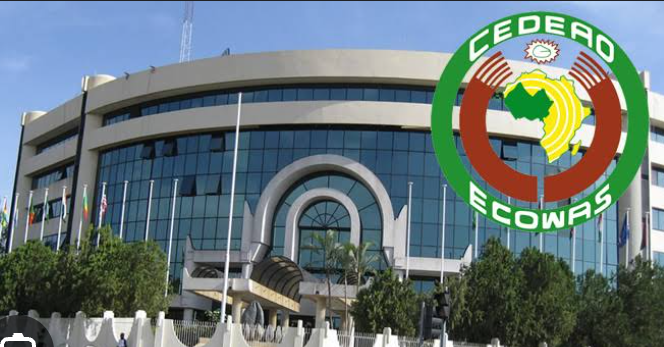News
ECOWAS Court quashes NGO’s claims of rights violations by Nigerian govt

By Kayode Sanni-Arewa
The ECOWAS Court of Justice has quashed the claims of human rights violations brought by a non-governmental organisation (NGO) that asked the Court to hold the Federal Republic of Nigeria liable for breaching its international obligation to protect human rights.
Justice Sengu Mohamed Koroma, Judge Rapporteur who delivered the judgement on Thursday said the Court dismissed all claims of rights violations due to lack of facts and evidence in support of the allegations, and ordered the NGO to pay a nominal cost of N100,000 to the Nigerian government.
The initiating application with suit number ECW/CCJ/APP/40/21 was filed on 22 July 2021 by The Registered Trustees of HEDA (Human and Environmental Development Agenda) Resource Centre, a registered NGO focused on anti-corruption, and non-partisan human rights and development in Nigeria.
The suit was premised on alleged failure of Nigeria to guarantee the rights to life, dignity of the human person, physical and mental health, and right to healthy environment for Nigerians particularly those residing in the oil producing areas of Nigeria.
Relying on Articles 1, 4, 5, 16 and 24 of the African Charter on Human and Peoples’ Rights (ACHPR), the Counsel representing the NGO claimed that despite the prohibition of gas flaring by an Act of government “Association of Gas Reinjection Act of 1979, gas flaring persisted, thereby exposing the people living in the oil producing areas to hazards including cancer, lung damage, deformities in children and skin problems.
He further claimed that environmental pollution from gas flaring contributed to global warming and climate change, adding that Nigeria’s failure to tackle it, has resulted in damaging effects on lives, the environment and monetary loss.
The NGO asked the Court to declare the continuous gas flaring in Nigeria as illegal and a gross violation of fundamental rights, and that the Nigerian government is obliged to stop gas flaring in Nigeria. It also demanded orders of the Court compelling the government to enforce gas flaring regulations against defaulters, and direct it to collect fines from defaulters.
In response, the State of Nigeria denied all the claims made by the NGO. The Counsel for the Respondent averred that the claims lacked facts and evidence, and were baseless, and urged the Court to dismiss them.
In its findings, the Court noted that the Respondent adduced proof of updated laws on regulation of the petroleum industry and other implementation measures taken to improve the environment in oil producing area and decrease gas flaring. It also noted that the NGO did not counter the submissions of the Respondent concerning its efforts to protect host communities.
As a matter of fact, the Court observed the failure of the NGO to provide any evidence supporting its claim of loss of lives, breach of the right to dignity of the human person, breach of right to physical and mental health, and lack of provision of a healthy environment owing to gas flaring. The Court therefore dismissed the claims for lack of proof.
Also on the panel were Justice Dupe Atoki and Justice Ricardo Claúdio Monteiro Gonçalves.
News
Reps Tackle CBN, OAGF Over Missing Grants, Bailout Funds

According to him, such financial mishandling not only disrupts critical public services and projects but also results in major losses to the nation’s purse—resources that could have been channelled into crucial services and developmental efforts, as laid out in Section 14(2)(b) of the Constitution.
Speaker Abbas, thereafter setup a Special Committee to be chaired by Rep. Chinedu Martins to immediately launch a probe into the “Utilisation of take-off grants, bailout funds, and interventions allocated to MDAs, government institutions, and GOEs from 2015 to present.”
News
Abuja light rail project must be commissioned on May 29-Wike vows

The FCT Minister, Mr. Nyesom Wike, expressed satisfaction with the progress on the Abuja light rail project, reaffirming its May 29 delivery as sacrosanct.
He made these assurances after inspecting the ongoing construction of access roads to the train stations on Wednesday, from Metro Train Station in the Central Area to Nnamdi Azikiwe International Airport, Abuja.
Reassuring journalists accompanying him, the minister reiterated that President Bola Tinubu would commission the rail project on May 29 to mark his second year in office.
The visited stations were Wupa station near Idu and Bassanjiwa station near the airport.
“This is part of our routine inspection of ongoing projects to see the contractors’ progress,” Wike explained.
“We are working day and night to fulfill our promise to President Tinubu and FCT residents. By May, Mr. President will ride on the Metro line.”
News
Just in: Alleged Herdsmen Armed With AK-47 Rifles Take Over Communities In Benue State

Gunmen suspected to be Fulani herdsmen are currently invading some communities in the Ukum Local Government Area of Benue State.
According to sources, the herdsmen armed with AK-47 rifles stormed the community around 04:15pm on Thursday.
“Our lives are in danger this evening, armed Fulani herdsmen, about 600 in numbers have taken over our communities this evening,” a resident told SaharaReporters.
“They’re currently moving around towns in Ukum Local Government Area of Benue state. No security personnel at all, Governor Alia didn’t send security, they said operation will start soon once they (herders) have observed the place.”
The insecurity situation in Benue has been alarming in recent weeks with attacks from gunmen suspected to be herdsmen.
The media had reported that suspected herdsmen again unleashed terror in Benue State, attacking three communities in Otukpo Local Government Area (LGA) on Wednesday, just a day after 11 people were killed in a deadly raid on Otobi community.
The latest victims of the escalating violence were Emichi, Odudaje, and Okpamaju, communities that had previously suffered an attack in February, which left five people dead.
However, the renewed attack has created fear and mass displacement among residents, with women and children fleeing to safety.
Local sources say the death toll from the fresh attack remains unclear, but several casualties are feared.
-

 News12 hours ago
News12 hours agoBREAKING: Unknown gunmen reportedly storm Senator Natasha’s family residence
-

 News15 hours ago
News15 hours agoSnub story on removal of Rivers Sole Administrator, it’s FAKE-Chief Registrar
-

 News21 hours ago
News21 hours ago“How my father escaped assassination” – Bishop Oyedepo’s daughter
-

 News21 hours ago
News21 hours agoFG expresses sympathy for CBEX victims, urges a united effort to combat Ponzi schemes
-

 News14 hours ago
News14 hours agoSAD! Again, Alleged Herdsmen Attack Three Benue Communities
-

 News7 hours ago
News7 hours agoAbuja light rail project must be commissioned on May 29-Wike vows
-

 Politics14 hours ago
Politics14 hours agoPDP govs are jokers, can’t stop coalition train, Atiku boasts
-

 News12 hours ago
News12 hours agoLawmaker Slams NBA Over Rivers Crisis, Demands Return of N300m





